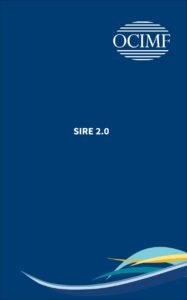The most exciting and positive prospect with the new programme is that it is risk-based, comments Mr. Savage who expects the focus on human element with SIRE 2.0 to ensure inspectors are sensitive to all pressures onboard.
The SIRE inspection regime is being overhauled with the introduction of tablet-based inspections, a more comprehensive inspection process and enhanced policies and procedures bringing significant changes to how tankers of all sizes are assessed by inspectors.
Instead of a static questionnaire with yes/no answers, SIRE 2.0 inspections will be conducted in digital format, in real-time, with inspectors completing a Compiled Vessel Inspection Questionnaire (CVIQ) using a tablet device.
The move to a digital solution means that every tanker inspection will be bespoke, with questions drawn from a large ‘SIRE 2.0 Question Library’ using an algorithm to select questions based on the type of vessel, its outfitting and operational history to create a one-time CVIQ for the SIRE Inspector to complete.
Four key areas of focus
- Accuracy: Facilitating an accurate description of how key safety and operational risks are managed and verified onboard a vessel.
- Capability: Training and developing inspectors who are of the highest quality, consistency and integrity.
- Reliability: Strengthening vessel inspections and reducing the number of repeat inspections required.
- Adaptability: More rapid response to human factors, industry changes, regulatory framework updates and technology advances.
As vessel owners, operators, managers and crew, inspectors or recipients of the SIRE 2.0 inspection reports will not be able to predict the inspection questions in advance, they should be prepared to respond to all questions within the SIRE 2.0 Question Library applicable to a particular vessel.
Further, every question will require the Inspector to give a response in relation to Hardware, Processes and Human Factors, and observations can be supported with photographs, where allowed, and documentary evidence.

“This more robust regime requires absolute adherence to best practice and should, by extension, tangibly improve vessel safety and environmental performance,” said OCIMF.
All users of the programme are strongly encouraged to take the time to review the SIRE Question Library documentation in full and follow the necessary Management of Change (MOC) actions. SIRE 2.0 is a significant departure from the existing inspection regime and all parties are advised to do their utmost to prepare for the change
Sam Megwa, Programmes Director, OCIMF, commented, adding that “this adjustment will take time, but OCIMF is “confident that industry will embrace the improved ability to assess the safe and environmentally responsible operations of vessels and their crews on an ongoing basis.”
OCIMF has been working on the new SIRE 2.0 regime since 2017 and is expected to become operational in 2022. Until then, the current SIRE programme will continue to be updated and improved to incorporate the latest standards, best practice and regulations.
The new inspection regime, known from this point forward as SIRE 2.0, will no longer be an acronym for Ship Inspection Report Exchange. In future SIRE 2.0 will encompass all of OCIMF’s inspection programmes. This includes OCIMF’s Barge Inspection Report programme (BIRE) and Offshore Vessel Inspection Database (OVID).
In general, the new programme will be enhanced by:
- A more comprehensive inspection regime with enhanced tools, strengthened governance processes and more in-depth reporting outcomes, following a risk-based approach.
- Enhanced inspection criteria on equipment, procedures and human factors, to further improve control over vessel safety systems and processes. Enhanced pre-inspection processes and more robust monitoring protocols on the inspection process will be included.
- The use of web-enabled tablet devices to allow inspections and feedback to be reported and documented in real-time and to allow inspections to be completed more efficiently, with the adoption of a comprehensive yet standardised reporting format.
- Updated policies, procedures, and user guidance housed in an online process documentation library.
- An enhanced governance process to provide greater transparency and control for all parties involved in the programme, either directly or indirectly; and the adoption of rules that are enforceable and verifiable by OCIMF.
- Significant enhancements to training and continuing development of inspectors to ensure the highest standard of delivery is maintained and improved.
The most exciting and positive prospect with the new programme is that it is risk-based, comments Mr. Savage who expects the focus on human element with SIRE 2.0 to ensure inspectors are sensitive to all pressures onboard.

